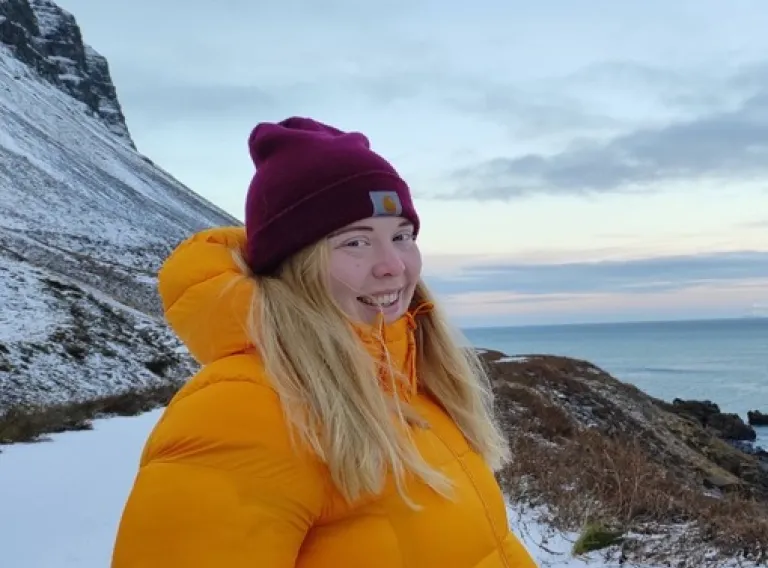Main building - the Aula
Doctoral candidate:
Theresa Henke
Title of thesis:
The establishment of European flounder (Platichthys flesus) in Icelandic waters
Opponents:
Dr. Skúli Skúlason, Professor at the department of Aquaculture and Fish Biology at Hólar University, Iceland
Dr. Ivan Jarić, Junior professor at the University of Paris-Saclay, France, and researcher at the Biology Centre of the Czech Academy of Sciences, Institute of Hydrobiology, Czech Republic
Advisors:
Dr Snæbjörn Pálsson, Professor at the Faculty of Life and Environmental Sciences, University of Iceland
Dr. Guðbjörg Ásta Ólafsdóttir, Director at University of Iceland Research Centre of the Westfjords, Iceland
Other members of the doctoral committee:
Dr. Hlynur Bárðarson, Senior scientist at the Marine and Freshwater Research Institute, Iceland
Dr. Jakob Hemmer-Hansen, Senior scientist at DTU-aqua, Denmark
Chair of Ceremony:
Dr. Gunnar Þór Jóhannesson, Professor and acting Head of Faculty of Life and Environmental Sciences
Abstract:
Biological invasions are a global phenomenon representing one of the biggest threats to biodiversity. Addressing species introductions, often marked by context dependency, requires the incorporation of multiple perspectives and disciplines to develop adequate management approaches. As humans are involved on multiple levels along the invasion process, this should furthermore encompass the consideration of human dimensions. European flounder (Platichthys flesus), a flatfish species native to western Europe, has been documented in Iceland since 1999. In the following years, European flounder rapidly spread and now mainly occurs in estuaries but is often encountered in freshwater habitats. Here it spatially overlaps with native salmonid which represent valuable recreational species, making the recreational angling community in Iceland an important stakeholder group. In this thesis, the most likely origin of European flounder was identified as the Faroe Islands utilizing microsatellite analysis. Following these results that revealed uncertainty concerning whether the species was introduced due to human activity or arrived naturally, the views of stakeholders and specialists concerning this uncertainty were assessed, indicating that the identification of a species’ introduction pathway is considered important but not prioritized over impact assessment and the development of management strategies. Involving the recreational angling community as a representative stakeholder group in the research has shown that European flounder is perceived highly negative but has furthermore highlighted spatial and temporal fluctuations in stakeholder perceptions. Exploring the knowledge of the recreational angling community further showed that utilizing stakeholder knowledge can represent a low-cost additional source in the monitoring of alien species.
About the doctoral candidate:
Born and raised in Germany, Theresa Henke earned her B.Sc. in Biology from the University of Bremen before moving to the Westfjords of Iceland in 2016. Here, she enrolled in the M.RM programme “Coastal and Marine Management” at the University Centre of the Westfjords in Ísafjörður, from which she graduated in April 2018. Motivated by a passion for the research on biological invasions and not wanting to leave living in Iceland behind, she decided to stay and continue her academic journey as a PhD student at the University of Iceland. Following her Master’s thesis on the ecological impact of alien European flounder, the focus of her PhD research remained on the establishment of this alien species in Iceland. Driven by encounters with people who shared their experiences with and concerns about European flounder, Theresa got interested in the human perspectives and dimensions of biological invasions and gradually incorporated these aspects into her PhD work. In September 2024, her academic career took a Mediterranean turn and she joined the IRIS team at the EEZA-CSIC in Almería, Spain as a postdoctoral researcher where she will dive deeper into the research on human dimensions of biological invasions.

Share
Buses 14, 1, 6, 3 and 12 stop at the University of Iceland in Vatnsmýri. Buses 11 and 15 also stop nearby. Let's travel in an ecological way!